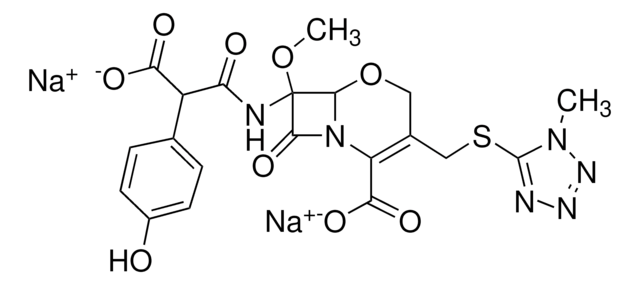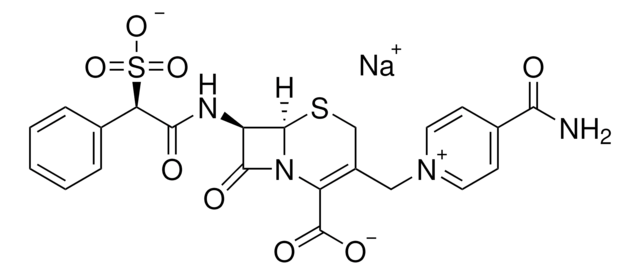N4382
Nalidixic acid sodium salt
powder
Synonym(s):
1-Ethyl-1,4-dihydro-7-methyl-4-oxo-1,8-naphthyridine-3-carboxylic acid sodium salt
About This Item
Recommended Products
form
powder
Quality Level
antibiotic activity spectrum
Gram-negative bacteria
Gram-positive bacteria
Mode of action
DNA synthesis | interferes
enzyme | inhibits
originator
Sanofi Aventis
SMILES string
[Na+].CCN1C=C(C([O-])=O)C(=O)c2ccc(C)nc12
InChI
1S/C12H12N2O3.Na/c1-3-14-6-9(12(16)17)10(15)8-5-4-7(2)13-11(8)14;/h4-6H,3H2,1-2H3,(H,16,17);/q;+1/p-1
InChI key
ROKRAUFZFDQWLE-UHFFFAOYSA-M
Looking for similar products? Visit Product Comparison Guide
General description
Application
Biochem/physiol Actions
Features and Benefits
Signal Word
Warning
Hazard Statements
Precautionary Statements
Hazard Classifications
Acute Tox. 4 Oral - Carc. 2
Storage Class Code
11 - Combustible Solids
WGK
WGK 3
Flash Point(F)
Not applicable
Flash Point(C)
Not applicable
Personal Protective Equipment
Certificates of Analysis (COA)
Search for Certificates of Analysis (COA) by entering the products Lot/Batch Number. Lot and Batch Numbers can be found on a product’s label following the words ‘Lot’ or ‘Batch’.
Already Own This Product?
Find documentation for the products that you have recently purchased in the Document Library.
Customers Also Viewed
Articles
Cell cycle phases (G1, S, G2, M) regulate cell growth, DNA replication, and division in proliferating cells.
Cell cycle phases (G1, S, G2, M) regulate cell growth, DNA replication, and division in proliferating cells.
Cell cycle phases (G1, S, G2, M) regulate cell growth, DNA replication, and division in proliferating cells.
Cell cycle phases (G1, S, G2, M) regulate cell growth, DNA replication, and division in proliferating cells.
Our team of scientists has experience in all areas of research including Life Science, Material Science, Chemical Synthesis, Chromatography, Analytical and many others.
Contact Technical Service










